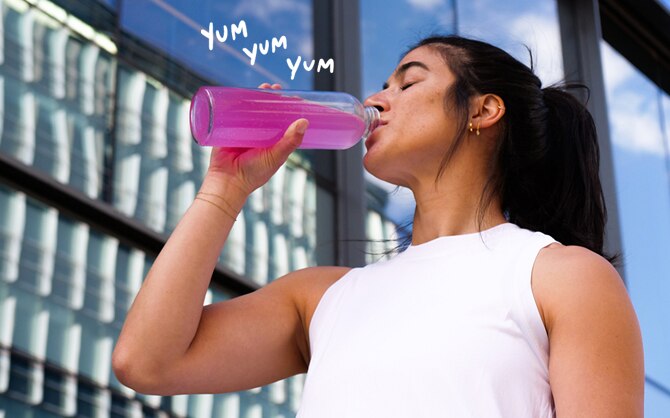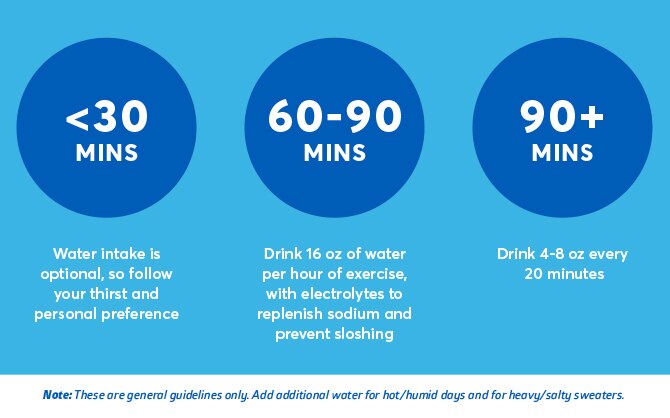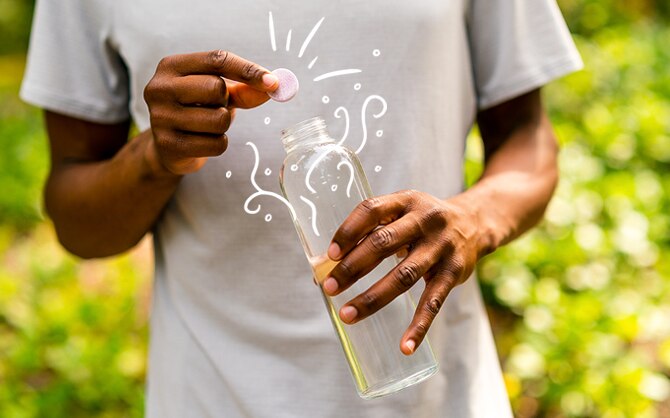For a Better Run, Hydrate All Day

A run is just one part of your busy day. But what you do — and what you drink! — for the rest of the day can have a major impact on your workout success.
Drinking more water goes a long way, but drinking water strategically will take you even farther. Why? Because dehydration happens fast, and it’s more common than you might think: Studies have found that a majority of athletes are dehydrated before beginning a workout!
To prevent that from happening to you, try approaching your water intake as a proactive, all-day process. Proper hydration is truly powerful, and it can change the way you feel from beginning to end of every workout.
Here are some tips to keep yourself on the right track:
Wake up with water
Before you do anything else, do this! Start your day with 8 ounces of water within 30 minutes of waking up. Your body will naturally wake up dehydrated after a night of sleep, so it’s important to kickstart your rehydration right away. The longer you wait, the more you’ll fall behind your hydration needs, setting off a deficit you’ll spend all day trying to pay off.
Drink up before you lace up
Heading out for a run? Before you go, try pre-hydrating, a simple strategy that can help delay dehydration while you’re running. All you need to do is plan ahead! About 90 minutes before you start your run, drink 16 ounces of water. Even better: Add some electrolytes to help your body to absorb it.

Say no to sloshing
You know that funky feeling during a run: like your belly has turned into a goldfish bowl? It might seem like your body is telling you to drink less water, but there’s another surprising explanation behind the slosh.
Here’s why it happens: Exercising causes your digestive processes to hit pause. So instead of absorbing the water you drink and distributing much-needed hydration throughout your body, the water sits heavy in the bottom of your stomach, sloshing around with every stride.
To combat sloshing: Try pairing your water with electrolytes and some simple carbohydrates to aid in absorption.
During your run: To drink or not to drink?
You may or may not need to hydrate during your run. It depends on a variety of factors, like the length and intensity of your workout and the temperature outside. Here are some simple guidelines to help you decide whether to bring water with you:
Length of workout + What to drink
- <30 minutes: Water intake is optional, so follow your thirst and personal preference
- 60-90 minutes: Drink 16 oz of water per hour of exercise, with electrolytes to replenish sodium and prevent sloshing
- 90+ minutes: Drink 4-8 oz every 20 minutes
Note: These are general guidelines only. Add additional water for hot/humid days and for heavy/salty sweaters.

Get home and rehydrate
This is your moment to replenish not just the moisture but also the electrolytes and minerals that you lost in sweat. Drink 16 ounces of water once you complete your run, and add some electrolytes to help rebalance your sodium and potassium levels.
Wind down with more water
Even though your work is done for the day, your body is still in need of liquids. Drink 4-6 ounces of water before bedtime to prevent dehydration and get ahead of tomorrow’s hydration needs. While your sleep, your body will have the water it needs to rest, recover, and prepare for another well-hydrated day ahead.

